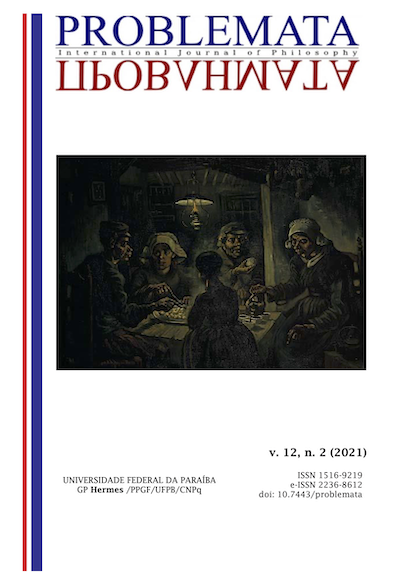ASPECTS OF THE COORDINATION BETWEEN SEMANTICS AND PHILOSOPHY IN GILBERT RYLE:
AN ARGUMENT ABOUT THE PHILOSOPHICAL NATURE OF SEMANTIC KNOWLEDGE
DOI:
https://doi.org/10.7443/problemata.v12i2.57900Keywords:
semantics, categories, philosophyAbstract
This paper explores the theses of two 1930s articles by Gilbert Ryle (Systematically Misleading Expressions and Categories), occasionally commenting two others papers (Meaning Theory and Ordinary Language) to discuss an alternative to the Quine-Davidsonian thesis that semantic knowledge about simpliciter truth and analytical truth is purely extensional, and do not involve any normative, conceptual or intensional knowledge about the identity of the studied semantic objects. Ryle's thesis is not an obvious opposition, as he agrees with Quine-Davidson on at least one key point: the thesis that semantic knowledge does not involve intensional objects. However, in addition to maintaining a normative view on the practice of signification, Ryle's thesis also contains an opposition to Quine-Davidson that is not obviously perceptible, although fundamental: he argues that structural knowledge about semantic connections involves an understanding of categories, that teaches language speakers to predict systematic antinomies or deceptions. Ryle believes that this knowledge is philosophical, as well as semantic. His thesis shows an aspect in which semantics and philosophy are not completely divorced. This article intends to remind this interpretative option to the universe of the current semantic discussion.
Downloads
References
DUMMET, M. Frege: Philosophy of Language. Harper and Row, Publishers, 1973.
HAACK, S. Filosofia das Lógicas. SP: Editora Unesp, 2002
FREGE, Gottlob. Lógica e Filosofia da Linguagem; org. trad. Paulo Alcoforado. São Paulo, Edusp, 2009.
QUINE, W.V.O. Ensaios. São Paulo: Abril Cultural, 1980.
QUINE, W.V.O. The Ways of Paradox: and other essays. New York: Random House, 1966.
KANT, I. (2013). Crítica da Razão Pura. Tradução de Manuela P. dos Santos e Alexandre F. Morujão. 8.ed. Lisboa: Fundação Calouste Gulbenkian.
RUSSEL, B. Lógica e Teoria do Conhecimento, Ensaios Escolhidos. [S.l.]: Abril Cultural, 1978.
RYLE, G. (1980) Expressões Sistematicamente Enganadoras e Outros Ensaios. São Paulo: Editora Abril Cultural.
TARSKI, A. The Concept of Truth in Formalized Languages. Reprinted in Logic, Semantics, Metamathematics. Papers from 1923 to 1938, 2nd ed. Indianapolis, Hackett Publishing Company, 2006, pp. 152–278
Downloads
Published
Issue
Section
License
Copyright (c) 2021 Lucas Ribeiro Vollet

This work is licensed under a Creative Commons Attribution 4.0 International License.
Authors who publish with this journal agree to the following terms:
- Authors retain copyright and grant the journal right of first publication with the work simultaneously licensed under a Creative Commons Attribution License that allows others to share the work with an acknowledgement of the work's authorship and initial publication in this journal.
- Authors are able to enter into separate, additional contractual arrangements for the non-exclusive distribution of the journal's published version of the work (e.g., post it to an institutional repository or publish it in a book), with an acknowledgement of its initial publication in this journal.
-
- Authors are permitted and encouraged to post their work online (e.g., in institutional repositories or on their website) prior to and during the submission process, as it can lead to productive exchanges, as well as earlier and greater citation of published work (See The Effect of Open Access).





